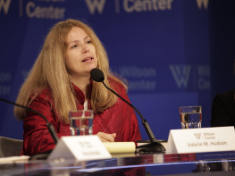-
Valerie M. Hudson on How Sex Shapes Governance and National Security Worldwide
January 22, 2021 By Amanda King “The very first political order in any society is the sexual political order established between men and women,” says Valerie M. Hudson, a University Distinguished Professor at Texas A&M, in today’s Friday Podcast, recorded at a recent Wilson Center launch of the book, The First Political Order: How Sex Shapes Governance and National Security Worldwide. Co-authored by Hudson, Donna Lee Bowen, Professor Emerita at Brigham Young University, and P. Lynne Nielson, a statistics professor at Brigham Young University, the book investigates how the relationship between men and women shapes the wider political order. “We argue, along with many other scholars, that the character of that first order molds the society, its governance, and its behavior,” says Hudson.
“The very first political order in any society is the sexual political order established between men and women,” says Valerie M. Hudson, a University Distinguished Professor at Texas A&M, in today’s Friday Podcast, recorded at a recent Wilson Center launch of the book, The First Political Order: How Sex Shapes Governance and National Security Worldwide. Co-authored by Hudson, Donna Lee Bowen, Professor Emerita at Brigham Young University, and P. Lynne Nielson, a statistics professor at Brigham Young University, the book investigates how the relationship between men and women shapes the wider political order. “We argue, along with many other scholars, that the character of that first order molds the society, its governance, and its behavior,” says Hudson.“The very first political order in any society is the sexual political order established between men and women,” says Valerie M. Hudson, a University Distinguished Professor at Texas A&M, in today’s Friday Podcast, recorded at a recent Wilson Center launch of the book, The First Political Order: How Sex Shapes Governance and National Security Worldwide. Co-authored by Hudson, Donna Lee Bowen, Professor Emerita at Brigham Young University, and P. Lynne Nielson, a statistics professor at Brigham Young University, the book investigates how the relationship between men and women shapes the wider political order. “We argue, along with many other scholars, that the character of that first order molds the society, its governance, and its behavior,” says Hudson.
“The subordination of women, the straitjacketing of women if you will, through this Syndrome, harms not just women, but children, men, and whole societies,” says Hudson, referring to the “Patrilineal/Fraternal Syndrome.” The Syndrome, as defined by Hudson and her co-authors, is a series of interlocking mechanisms designed to keep women subordinated. These mechanisms start with the violent coercion of women by men to get what they want and loop, like magnetic beads, to systematic means of female control, such as son preference, early marriage, polygamy, bride price, and dowries. “The syndrome is really a trap,” says Hudson, and the subordinate system sets societies up for poor health, food insecurity, low economic performance, demographic woes, and a lack of attention to environmental security.
The Syndrome leads societies to unfortunate outcomes “because it’s based upon a first political order of instability, domestic instability, domestic violence, domestic terror, domestic corruption, and domestic autocracy.” Hudson says in discussing these topics with U.S. national security audiences she asks whether the audience considers themselves to be national security realists—if they believe the treatment of women does affect national security instability and if they believe that the women, peace, and security agenda is in the national interest. “Can you call yourself a realist if you don’t?” she asks. “If the U.S. isn’t tracking the situation with women, how is it going to effectively anticipate instability in other countries?”
“Let’s suppose that we accept that women matter. What would change in how we do business?” asks Hudson. Without accepting that women matter, how could the U.S. know to avoid peace negotiations that are detrimental for women; track internal threats if domestic violence isn’t viewed as domestic terror perpetration; recognize that ending child marriage globally would do more for world peace than any other investment; and know when exporting democracy could be effective, and where it’s likely to fail. “I believe that one day the idea that foreign policy or national security policy could ignore the situation of women will be seen as laughably naive,” says Hudson.
Friday Podcasts are also available for download on iTunes and Google Podcasts.
 A Publication of the Stimson Center.
A Publication of the Stimson Center.

 “The very first political order in any society is the sexual political order established between men and women,” says Valerie M. Hudson, a University Distinguished Professor at Texas A&M, in today’s Friday Podcast, recorded at a recent Wilson Center launch of the book,
“The very first political order in any society is the sexual political order established between men and women,” says Valerie M. Hudson, a University Distinguished Professor at Texas A&M, in today’s Friday Podcast, recorded at a recent Wilson Center launch of the book, 

